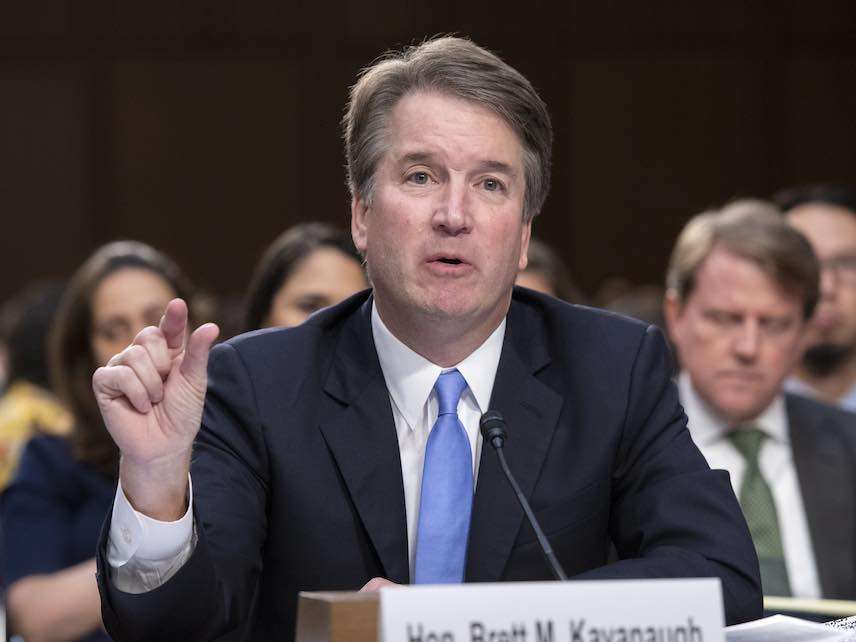ThinkProgress Accuses Facebook of Censorship After Conservative Factchecker Correctly Points Out an Error
"Brett Kavanaugh said he would kill Roe v. Wade last week." Except he didn't.

Ian Millhiser, justice editor at ThinkProgress, is upset that The Weekly Standard—a right-of-center magazine whose editors have been granted the power to formally factcheck articles for Facebook—recently labelled one of his articles "false."
But the claim made by the article's headline—"Brett Kavanaugh said he would kill Roe v. Wade last week and almost no one noticed"—is at the very least quite misleading.
ThinkProgress is a left-of-center news site published by the Center for American Progress. Its writers have previously expressed concerns that Facebook would award an explicitly conservative media outlet factchecker status, a privilege enjoyed by just four other organizations: the Associated Press, Factcheck.org, Politifact, and Snopes.com. Articles tagged as false will lose "80 percent of future traffic," according to Facebook CEO Mark Zuckerberg, and thus the stakes are indeed quite high for media organizations.
"At its peak, Facebook provided as much as 40 percent of ThinkProgress' traffic," writes Millhiser. "Facebook recently changed its algorithm in ways that reduced the amount of traffic it sent to most news outlets, but it still accounts for between 10 to 15 percent of our readers. The difference between keeping those readers and losing them could decide whether we can hire more reporters who will continue to report on subjects that the Weekly Standard may have ideological disagreements about."
Millhiser continued:
As a legal matter, Facebook is treading on very dangerous ground by providing no oversight of its own "fact checking" operation.
In its landmark decision in New York Times v. Sullivan, the Supreme Court held that an outlet can be liable for defamation if it publishes false information "with knowledge that it was false or with reckless disregard of whether it was false or not."
By deferring to The Weekly Standard's "expertise and process," Facebook acted with reckless disregard of whether The Weekly Standard's article was false or not.
Millhiser appears to believe that (1) The Weekly Standard erred in labelling the article false, (2) Facebook erred in giving The Weekly Standard this power in the first place, and (3) by refusing to correct these errors, Facebook may have exposed itself to liability for defamation.
Claim #2 is a judgement call, and I can't say whether it's correct. Maybe giving ideological groups factchecking powers was not a good move for Facebook. I won't tackle that topic here.
But claims 1 and 3 collapse if The Weekly Standard's fact-checkers made the right call regarding the "false" article. (Actually, 3 strikes me as dubious, regardless. Defamation is a high bar to clear.) Let's take a look.
Again, the headline is "Brett Kavanaugh said he would kill Roe v. Wade last week and almost no one noticed." But Millhiser's article makes a more nuanced argument. As he summarizes it in the follow-up post:
Kavanaugh cited in his confirmation hearing the "Glucksberg test"—which refers to Washington v. Glucksberg, a 1997 Supreme Court decision establishing that the Constitution does not protect a right to physician-assisted suicide. Under Glucksberg, courts should determine which rights are protected by the Constitution by asking which rights are "deeply rooted in this Nation's history and tradition."
Kavanaugh also said in 2017 that "even a first-year law student could tell you that the Glucksberg's approach to unenumerated rights was not consistent with the approach of the abortion cases such as Roe vs. Wade in 1973, as well as the 1992 decision reaffirming Roe, known as Planned Parenthood vs. Casey."
Our article also cited law professors Jim Oleske and Jamal Greene, both of whom reached similar conclusions regarding Kavanaugh's embrace of Glucksberg.
Does this information imply that Kavanaugh would be inclined to overturn Roe v. Wade? A reasonable person might infer that this is so. The article concludes with this statement: "Judge Kavanaugh appears to be telegraphing his belief that Roe, Obergefell, and the Supreme Court's decision in Lawrence v. Texas, which provides that the government cannot prosecute consenting adults for having sex, were not correctly decided."
If the headline had said that Kavanaugh had "appeared to be telegraphing," or "hinted at," or even "heavily suggested" he would kill Roe v. Wade, that would be one thing. But "said" is a strong word. It makes it sound like Kavanaugh directly stated his intention to kill Roe v. Wade.
In his follow-up, Millhiser concludes that this all hinges on the definition of the verb "said." So he turns to the dictionary, which does indeed list "indicate, show, and communicate," as possible definitions for the word. But said is generally used as a synonym for indicate, show, and communicate when the subject of the sentence is a thing that can't use words. That look in your eyes can say a great deal, but not literally—a "look" doesn't use words. People, on the other hand, do use words, so when writers describe a person as having said something, it's implied that they did so with their mouths.
This may seem like nitpicking, but we're in the midst of an intense news cycle revolving around the question of whether Associate Justice Brett Kavanaugh would vote to overturn Roe v. Wade. A headline that straightforwardly claims he admitted he would do so is manipulating readers' expectations, and thus the claim should have been hedged in the headline—even just a little bit—as it was in the article. If the claim is The Weekly Standard was wrong to say this headline is false, then I rate this claim: Mostly false.


Show Comments (192)